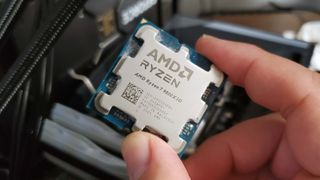AMD's X3D chips have long been some of the best for gaming because they stack tons of 3D V-Cache either on top of or underneath the processor, and games absolutely love all that cache. We had the AMD Ryzen 7 9800X3D launch late last year, this being the current best CPU for gaming, and now, AMD's just announced two even more powerful versions.
The two new chips, the just-announced AMD Ryzen 9 9900X3D and Ryzen 9 9950X3D, should be available from Q1 this year.
They don't come as a complete surprise, either—indeed, they were two of the main PC gaming components we were anticipating for 2025. That's because the 7000-series also featured a Ryzen 9 7900X3D and Ryzen 9 7950X3D (although these actually launched before the Ryzen 7 7800X3D).
Swipe to scroll horizontally
| AMD Ryzen 9 9950X3D | 16 / 32 | 5.7 GHz | 144 MB | 170 W |
| AMD Ryzen 9 9900X3D | 12 / 24 | 5.5 GHz | 140 MB | 120 W |
| AMD Ryzen 7 9800X3D | 8 / 16 | 5.2 GHz | 104 MB | 120 W |
As with these 7000-series chips, AMD has now confirmed that the 9900X3D and 9950X3D will feature a split design where the 3D-stacked cache sits on top of just one of the two dies, meaning half of the processor's cores can benefit from the 3D cache but the other half can—at least in theory—benefit from higher clock speeds.
At least, that's the theory. We'll have to see how they stack up (sorry) in practice. The "higher clock speed" argument for the non-stacked die made sense with the top two 7000-series X3D chips because the cache sat on top of the die, which stood in the way of cooling. But with these 9000-series X3D chips the cache is underneath, so cooling isn't as much of an issue—that's one of the big pluses of the latest chips compared to the 7000-series.

Nevertheless, the boost clocks are rated higher on the 9900X3D and 9950X3D than on the 9800X3D—300 MHz and 500 MHz higher, respectively.
But on the cache front, note that with the 9900X3D we're only getting six cores (half of its total 12) that can access the stacked cache. And of the 9950X3D's 16 cores, we're getting the same number with access to the stacked cache as we get with the 9800X3D—just eight.
While we won't know until we test it, this might mean little benefit for gaming compared to the 9800X3D, given the stacked cache and number of cores able to access it will remain the same.
One of AMD's charts shows the 9950X3D to be 8% faster on average than the 7950X3D for gaming, but that's the previous-gen X3D chip, not the current-gen one. However, another chart shows it to be 20% faster than the Intel Core Ultra 9 285K, and that's Intel's current best offering.

So what's the benefit? Well, we get the higher boost clocks, for sure, but we also get more total cores. Which should mean better multithreaded productivity performance.
And we can see that this bears out in AMD's testing—which should obviously be taken with a pinch of salt. In content creation apps, for instance, AMD claims 10% average faster creation based on 20 apps tested compared to the Intel Core Ultra 9 285K and 13% faster than the 7950X3D.
We really will have to test all this for ourselves, though, not least because mixing and matching dies and stacked caches can make it so that software has to decide whether and how to divvy up its workloads—whether to use more cache or faster core speeds. That's the same problem that faced the 7900X3D and 7950X3D.
Whatever the case, it's exciting to have some new, powerful X3D chips just around the corner.

 1 week ago
8
1 week ago
8









 English (US) ·
English (US) ·